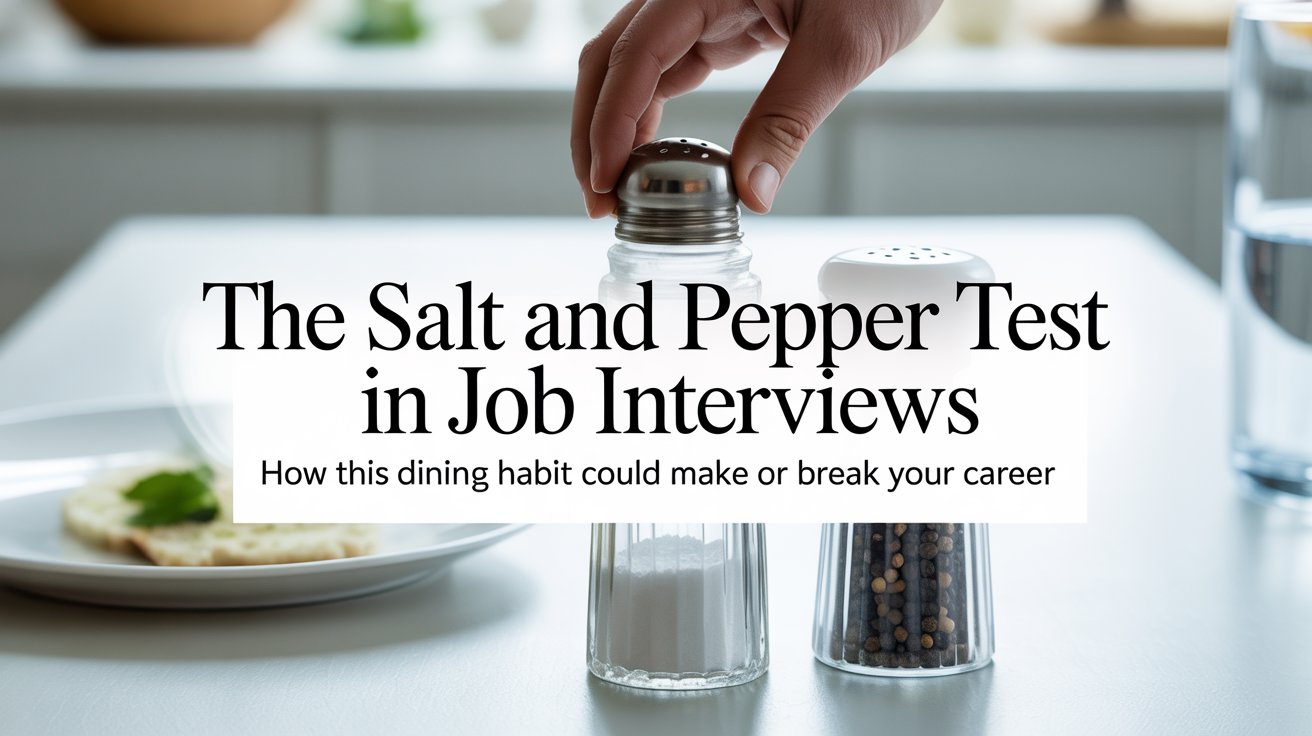The Salt and Pepper Test: The 5-Second Interview Mistake That Could Cost You the Job
This is the job interview secret no one’s warning you about: the salt and pepper test. Here’s how a condiment decision reveals your mindset—and why it could decide your next offer.
✅ Key Takeaways
- The Salt and Pepper Job Interview Test is a hidden hiring tactic where employers observe if you season your food before tasting it during interview meals.
- It originated with Thomas Edison and is still used today, often without your knowledge.
- It’s not about salt. It’s about whether you act on assumptions—or gather data before deciding.
- If you season first, you might get rejected without even knowing why.
- You don’t need to play games. You need to understand the game being played.
⚡️ Introduction: You’re Not Being Interviewed. You’re Being Watched.
When you sit down for an interview lunch, most people think, “Finally, a break from the questions.”
Wrong.
In some companies, this is the real interview.
Not based on your degree. Not your resume. Not your credentials.
But on whether you taste your food before reaching for salt.
It sounds ridiculous. But it’s real. It’s called The Salt and Pepper Test, and if you don’t know how to handle it, it could cost you six figures.
This article will show you exactly what it is, who uses it, why it exists, and how to beat it—without compromising your integrity.
🧠 What Is the Salt and Pepper Job Interview Test?
Let’s break it down:
A hiring manager watches if you add salt, pepper, or sauce to your meal before tasting it.
If you do: they think you’re impulsive or act based on assumptions.
If you don’t: they think you’re thoughtful and base decisions on evidence.
It’s that simple. But also that dangerous—because it’s done silently. You’re being evaluated and you don’t even know it.
And yes, this actually happens. A ton.
“A guy I worked with would always base his hiring decision on whether someone tasted their food before seasoning. If they added anything first—they were out.”
👨🔬 The Test Goes Back to Edison (Seriously)
This isn’t some TikTok trend. It goes back to Thomas Edison.
When interviewing research assistants, he’d serve them soup. If they salted it before tasting, he eliminated them.
Why?
Because to him, seasoning first = assumptions.
And assumptions, in science and innovation, are death. He only wanted curious, analytical thinkers on his team.
“[Edison] wanted people who didn’t make decisions until they had all the data.”
🔍 Why Employers Still Use It
The Salt and Pepper Test is a metaphor. It’s not about food. It’s about how you make decisions under uncertainty.
Here’s what interviewers are (silently) testing for:
| Behavior | Interpretation |
|---|---|
| Tasting first | Thoughtful, data-driven, adaptable |
| Seasoning without tasting | Assumptive, impulsive, rigid |
This is not just theory. It’s used in:
- Tech startups
- Consulting firms
- Sales organizations
- Finance roles
Because those industries value critical thinking, fast learning, and flexibility.
🧂 Other Real-World Examples
The Coffee Cup Test
Created by Trent Innes, ex-CEO of Xero Australia. He gives candidates coffee and watches if they return the cup.
“If you leave the cup, you won’t get hired.”
— Economic Times
Why? Because it shows ownership.
The Receptionist Test
They ask the front desk how you acted in the lobby.
If you were rude? Automatic rejection.
“You can fake nice for an hour. You can’t fake who you are to strangers.”
— Jeff Haden, Inc.com
🤯 The Real Danger: You’re Being Judged Without Knowing
That’s what makes this test dangerous: it’s stealth mode evaluation.
No one tells you it’s happening. But it affects the final decision.
“I didn’t get the job. Only later did I hear it was because I used hot sauce before tasting.”
🧩 The Psychology Behind the Test
Here’s what hiring managers believe it reveals:
- Cognitive patience – do you act before assessing?
- Adaptability – do you assume things are wrong?
- Habit vs. Intent – are you on autopilot?
Most companies won’t say this aloud—but they’re desperate to find people who can think independently, adjust quickly, and take action deliberately.
That’s what the test aims to uncover.
⚠️ But Here’s the Problem: It’s Flawed
Let’s be clear: this is not a perfect tool.
Why?
- Cultural bias – In some cultures, seasoning first is normal.
- Zero transparency – You don’t know you’re being evaluated.
- Assumptions = Assumptions – The interviewer is doing the exact thing they’re testing you for.
So yes—it’s clever. But also risky, flawed, and unscientific.
🛡️ How to Pass the Salt and Pepper Test (Without Selling Your Soul)
Want the cheat code?
Step 1: Taste Your Food First
Simple. It costs nothing. Signals awareness.
Step 2: If You Season, Do It Thoughtfully
Say:
“It’s great, just adding a personal touch. I like a little more heat.”
Now it’s not impulse. It’s intention.
Step 3: Mirror the Interviewer
If they season first, you’re safe. If they don’t—definitely don’t.
💼 What It Means For You As a Job Seeker
This is the truth:
You’re not just being evaluated by your answers. You’re being judged by your actions.
The people doing the hiring are looking for clues about how you think.
Most of them don’t care about resumes anymore. They care about decision-making under pressure.
If you’re blind to these signals, you’re gambling your career.
If you know the rules—you can play to win.
Invisible Interview Framework
- Salt & Pepper Test: Do you make assumptions before evaluating?
- Coffee Cup Test: Do you clean up without being told?
- Receptionist Test: Are you consistent in behavior with all people?
- Car Test: Do you take care of your own space?
❓ FAQs
Q1: Is the Salt and Pepper Test real?
Yes. It’s used by hiring managers and recruiters, especially in informal or meal-based interviews. Source
Q2: Will seasoning my food cost me the job?
In companies that use this test—possibly. It’s seen as acting without assessing.
Q3: How should I behave during a lunch interview?
Be present. Taste food before seasoning. Mirror the interviewer. Be polite to all staff.
Q4: Can I ask if I’m being tested?
You can—but they likely won’t tell you. It’s meant to be stealth.
Q5: What’s the best way to prepare for hidden interview evaluations?
Practice situational awareness. Stay intentional in everything you do—from how you sit to how you shake hands.
Q6: Is this ethical?
Debatable. It offers insight, but also lacks transparency and opens the door to bias.
🎯 Conclusion: Salt. Taste. Decide. Just Like at Work.
The Salt and Pepper Test isn’t really about condiments.
It’s about how you operate in uncertainty.
Season first? You’re assuming.
Taste first? You’re observing.
Explain your choice? You’re intentional.
The hiring world is evolving. Interviews are less about what you say and more about how you behave when you think no one’s watching.
Now you know. So next time you’re at that interview lunch—don’t just chew. Choose.
Talk Resumes with Wealth Waggle
Perfect your resume with AI-assisted feedback and tips (using the latest recruiting intelligence).









